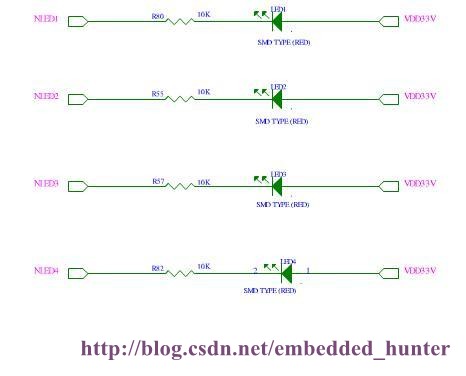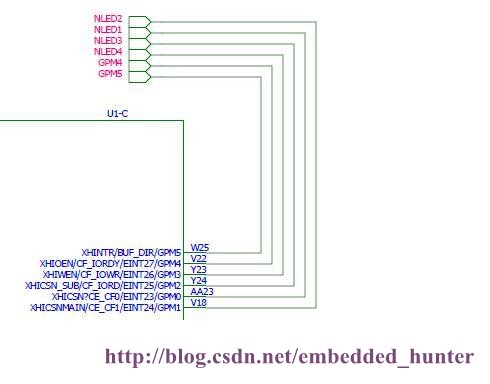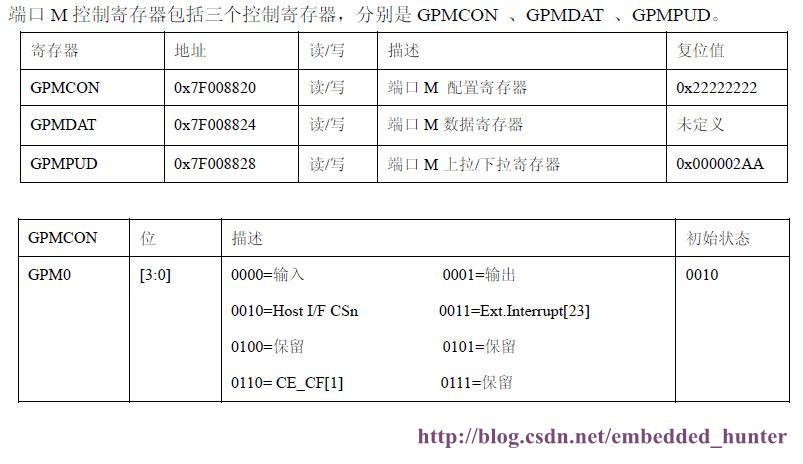(转)“手把手教你学linux驱动开发”OK6410系列之03---LED字符设备驱动
来源:互联网 发布:curl算法 编辑:程序博客网 时间:2024/04/30 18:27
2011-12-22 09:44:24| 分类:Embeded |字号 订阅
作者:沧海猎人 出处:http://blog.csdn.net/embedded_hunter
上一篇文章我们介绍了字符设备驱动程序的框架,本篇文章我们将操作真实的硬件---LED。
一、实验环境
开发机环境
操作系统:ubuntu 9.10
交叉编译环境:arm-linux-gcc 4.2.2 ,安装位置 /usr/local/arm/4.3.2/
6410板子内核源码路径:/work/linux-2.6.36.2-v1.05/
目标板环境:OK6410-A linux2.6.36
二、实验原理
控制LED是最简单的一件事情,我们学习LED驱动程序,就相当于学习其他编程语言是的“hello world”程序一样,是一个入门的程序。
学习驱动程序,必须要对硬件有所了解,接下来看几个与硬件相关的材料。

OK6410 LED原理图

OK6410 LED原理图
从上面的原理图可以得知,LED与CPU引脚的连接方法如下,低电平点亮。
LED1 -GPM0
LED2 -GPM1
LED3 -GPM2
LED4 -GPM3
从数据手册可以找到相应的控制方法。这里我们以LED1为例,介绍一下LED1的操作方法,其他的类似,请大家自行分析。

通过上面可以得知,需要先将GPM0设置为输出方式。将相应的寄存器进行配置。

然后将GPMDAT寄存器的第0位置0灯亮,置1灯灭。
三、实验步骤
1、编写驱动程序
driver_led.c
- #include <linux/module.h>
- #include <linux/kernel.h>
- #include <linux/fs.h>
- #include <asm/uaccess.h> /* copy_to_user,copy_from_user */
- #include <linux/miscdevice.h>
- #include <linux/pci.h>
- #include <mach/map.h>
- #include <mach/regs-gpio.h>
- #include <mach/gpio-bank-m.h>
- #include <plat/gpio-cfg.h>
- #define LED_MAJOR 240
- int led_open (struct inode *inode,struct file *filp)
- {
- unsigned tmp;
- tmp = readl(S3C64XX_GPMCON);
- tmp = (tmp & ~(0x7U<<1))|(0x1U);
- writel(tmp, S3C64XX_GPMCON);
- printk("#########open######\n");
- return 0;
- }
- ssize_t led_read (struct file *filp, char __user *buf, size_t count,loff_t *f_pos)
- {
- printk("#########read######\n");
- return count;
- }
- ssize_t led_write (struct file *filp, const char __user *buf, size_t count,loff_t *f_pos)
- {
- char wbuf[10];
- unsigned tmp;
- printk("#########write######\n");
- copy_from_user(wbuf,buf,count);
- switch(wbuf[0])
- {
- case 0: //off
- tmp = readl(S3C64XX_GPMDAT);
- tmp |= (0x1U);
- writel(tmp, S3C64XX_GPMDAT);
- break;
- case 1: //on
- tmp = readl(S3C64XX_GPMDAT);
- tmp &= ~(0x1U);
- writel(tmp, S3C64XX_GPMDAT);
- break;
- default :
- break;
- }
- return count;
- }
- int led_release (struct inode *inode, struct file *filp)
- {
- printk("#########release######\n");
- return 0;
- }
- struct file_operations led_fops ={
- .owner = THIS_MODULE,
- .open = led_open,
- .read = led_read,
- .write = led_write,
- .release = led_release,
- };
- int __init led_init (void)
- { int rc;
- printk ("Test led dev\n");
- rc = register_chrdev(LED_MAJOR,"led",&led_fops);
- if (rc <0)
- {
- printk ("register %s char dev error\n","led");
- return -1;
- }
- printk ("ok!\n");
- return 0;
- }
- void __exit led_exit (void)
- {
- unregister_chrdev(LED_MAJOR,"led");
- printk ("module exit\n");
- return ;
- }
- module_init(led_init);
- module_exit(led_exit);
Makefile文件
- obj-m := driver_led.o
- KDIR :=/work/linux-2.6.36.2-v1.05/
- all:
- make -C $(KDIR) M=$(shell pwd) modules
- install:
- cp driver_led.ko /tftpboot/
- clean:
- make -C $(KDIR) M=$(shell pwd) clean
2、编写测试程序
test.c
- #include <stdio.h>
- #include <sys/types.h>
- #include <sys/stat.h>
- #include <fcntl.h>
- int main (void)
- {
- int fd;
- char buf[10]={0,1};
- fd = open("/dev/my_led",O_RDWR);
- if (fd < 0)
- {
- printf ("Open /dev/my_led file error\n");
- return -1;
- }
- while(1)
- {
- write(fd,&buf[0],1);
- sleep(1);
- write(fd,&buf[1],1);
- sleep(1);
- }
- close (fd);
- return 0;
- }
3、编译驱动程序与测试程序
编译驱动程序
#make
将驱动程序放到tftp的工作目录 /tftpboot
#make install
编译测试程序
#arm-linux-gcc test.c -o test
将测试程序放到tftp的工作目录 /tftpboot
#cp test /tftpboot
4、将程序下载到开发板
将开发板的IP地址修改,与主机在同一个网段。确保PC的tftp服务开启。
下载程序到开发板
SMDK6410# tftp -l /lib/modules/2.6.36.2/driver_led.ko -r driver_led.ko -g 192.168.1.111 192.168.1.111为服务器IP
SMDK6410# tftp -l test -r test -g 192.168.1.111
5、测试
加载驱动 #insmod /lib/modules/2.6.36.2/driver_led.ko
创建设备文件 #mknod /dev/my_led c 240 0
测试 ./test
[root@FORLINX6410]# ./test
此时可以看到OK6410板子上的LED0在闪烁。
卸载驱动 #rmmod driver_led
从上面的结果我们可以看到,当用户调用相应的文件操作函数时,驱动程序中的相应的函数也会被调用。
大家可以修改相应程序,测试一下其他的情况。
- “手把手教你学linux驱动开发”OK6410系列之03---LED字符设备驱动
- “手把手教你学linux驱动开发”OK6410系列之03---LED字符设备驱动
- “手把手教你学linux驱动开发”OK6410系列之03---LED字符设备驱动 .
- “手把手教你学linux驱动开发”OK6410系列之03---LED字符设备驱动
- 手把手教你学linux驱动开发”OK6410系列之03---LED字符设备驱动
- “手把手教你学linux驱动开发”OK6410系列之03---LED字符设备驱动
- “手把手教你学linux驱动开发”OK6410系列之03---LED字符设备驱动
- 手把手教你学linux驱动开发 OK6410系列之03---LED字符设备驱动
- (转)“手把手教你学linux驱动开发”OK6410系列之03---LED字符设备驱动
- “手把手教你学linux驱动开发”OK6410系列之02---LED字符设备驱动 .
- “手把手教你学linux驱动开发”OK6410系列之02---虚拟字符设备
- “手把手教你学linux驱动开发”OK6410系列之02---虚拟字符设备
- “手把手教你学linux驱动开发”OK6410系列之02---虚拟字符设备
- “手把手教你学linux驱动开发”OK6410系列之02---虚拟字符设备
- “手把手教你学linux驱动开发”OK6410系列之02---虚拟字符设备
- 手把手教你学linux驱动开发”OK6410系列之02---虚拟字符设备
- 手把手教你学linux驱动开发:模块编程、虚拟字符设备编程、LED字符设备驱动
- “手把手教你学linux驱动开发”OK6410系列之01---模块编程
- HDU1698:Just a Hook(线段树区间更新)
- 求1000以内的所有偶数和 3
- 分段函数求值2
- aix 5.3 下 aio tcp 通信
- YUV 测试序列收集
- (转)“手把手教你学linux驱动开发”OK6410系列之03---LED字符设备驱动
- Linux驱动开发之环境搭建----Ubuntu 12.4 编译内核
- 还是求和,这个有点难度
- 计算分数的和
- eclipse tomcat 更改内存缓冲区
- 『常识』中断、轮询
- 套接字选项
- linux小记
- 1-20求和


